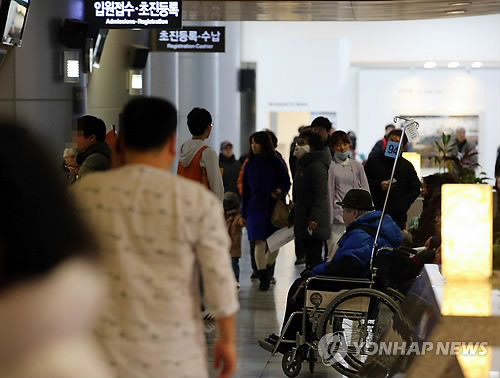Seoul announced Tuesday that it would launch the long-awaited pilot program for telemedicine services in hospitals starting this month, without the support and participation of the largest representative group of doctors here.
Telemedicine is the use of information technology and telecommunication in order to provide clinical health care at a distance.
The service, if legalized after the pilot project, would benefit the disabled, those who live in remote areas, and immobile, elderly patients with chronic conditions that need constant medical attention, the government said.
“The pilot project is being held in five regions nationwide, including Seoul, Gangwon, South Chungcheong, North Gyeongsang, and South Jeolla provinces,” the Health Ministry said in a statement.
“One of the purposes of the project is to assess the effectiveness, efficiency and safety of telemedicine.”
Telemedicine is the use of information technology and telecommunication in order to provide clinical health care at a distance.
The service, if legalized after the pilot project, would benefit the disabled, those who live in remote areas, and immobile, elderly patients with chronic conditions that need constant medical attention, the government said.
“The pilot project is being held in five regions nationwide, including Seoul, Gangwon, South Chungcheong, North Gyeongsang, and South Jeolla provinces,” the Health Ministry said in a statement.
“One of the purposes of the project is to assess the effectiveness, efficiency and safety of telemedicine.”

The plan to launch such services, however, has been fiercely resisted by doctors here since earlier this year.
Local physicians argue that the new system could hurt smaller clinics and only benefit large general hospitals that are equipped with the required technology.
They also stress that a lot of diseases, such as appendicitis, cannot be diagnosed and treated at a distance.
In March, the Korean Medical Association, the nation’s largest representative body of doctors, launched a strike to protest against the government’s plan.
The two parties eventually agreed to launch a pilot project in June, but it was called off as KMA’s internal conflicts regarding the government’s deregulation of the nation’s medical sector, including the telemedicine plan, led to the impeachment of its former president Noh Hwan-gyu.
The upcoming pilot program, which officially begins on Sept.19, is therefore being launched without the participation of the KMA.
Smaller representative groups of doctors are participating instead, and some 1,200 patients will benefit from the six-month project through a total of 11 health institutions nationwide, said the Health Ministry.
In response to the KMA’s concerns, the ministry stressed that the project was being held not just in general hospitals, but also in smaller clinics and public health centers.
Also, the project will only involve patients with diabetes or high blood pressure, as well as those with mild medical conditions that do not always require in-person treatment, the ministry said.
“And should a participating patient wish to see his or her doctor in person, they will be able to do that,” the ministry added.
Each participating patient will be given their own equipment for the treatment ― such as glucose meters and blood pressure monitors.
The participants, including remote-site patients, will be asked to monitor their own medical conditions at home and share the information with their doctors during their weekly online meetings, using telecommunication devices including smartphones.
The Park Geun-hye administration last year openly included telemedicine as part of its creative economy agenda, which promotes economic innovation in specific sectors including tourism, software and health care services.
The telemedicine plan, along with the government’s recent move to allow medical corporations to set up for-profit subsidiaries, is partly aimed at attracting more foreign investors to the country’s health care industry, as well as foreign suppliers and manufacturers of telehealth technologies.
If the pilot project proves to be successful, the telemedicine bill will likely be effective starting next year.
“We will continue speaking with KMA in regards to their participation in the pilot program, even after it officially begins,” said the Health Ministry.
By Claire Lee (dyc@heraldcorp.com)




![[Herald Interview] 'Amid aging population, Korea to invite more young professionals from overseas'](http://res.heraldm.com/phpwas/restmb_idxmake.php?idx=644&simg=/content/image/2024/04/24/20240424050844_0.jpg&u=20240424200058)














![[Today’s K-pop] Kep1er to disband after 2 1/2 years: report](http://res.heraldm.com/phpwas/restmb_idxmake.php?idx=642&simg=/content/image/2024/04/25/20240425050792_0.jpg&u=)